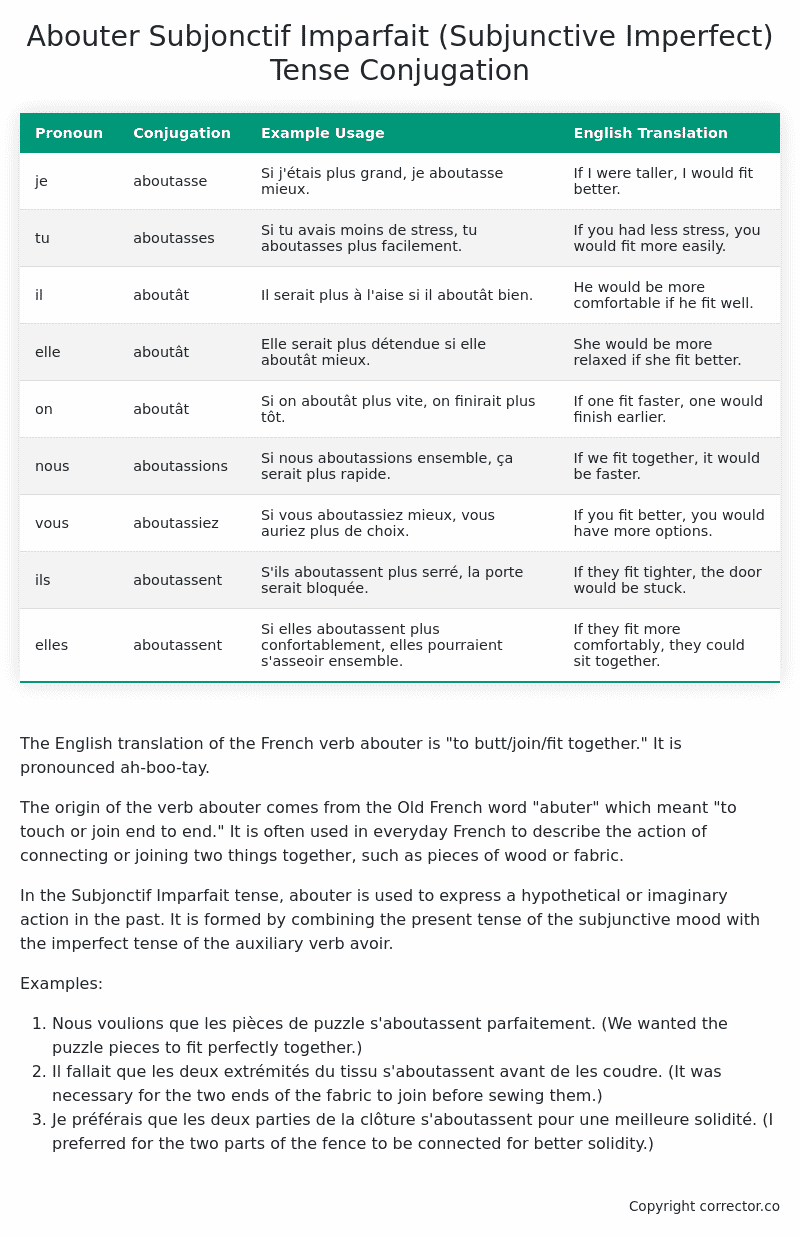Subjonctif Imparfait (Subjunctive Imperfect) Tense Conjugation of the French Verb abouter
Introduction to the verb abouter
The English translation of the French verb abouter is “to butt/join/fit together.” It is pronounced ah-boo-tay.
The origin of the verb abouter comes from the Old French word “abuter” which meant “to touch or join end to end.” It is often used in everyday French to describe the action of connecting or joining two things together, such as pieces of wood or fabric.
In the Subjonctif Imparfait tense, abouter is used to express a hypothetical or imaginary action in the past. It is formed by combining the present tense of the subjunctive mood with the imperfect tense of the auxiliary verb avoir.
Examples:
- Nous voulions que les pièces de puzzle s’aboutassent parfaitement. (We wanted the puzzle pieces to fit perfectly together.)
- Il fallait que les deux extrémités du tissu s’aboutassent avant de les coudre. (It was necessary for the two ends of the fabric to join before sewing them.)
- Je préférais que les deux parties de la clôture s’aboutassent pour une meilleure solidité. (I preferred for the two parts of the fence to be connected for better solidity.)
Table of the Subjonctif Imparfait (Subjunctive Imperfect) Tense Conjugation of abouter
| Pronoun | Conjugation | Example Usage | English Translation |
|---|---|---|---|
| je | aboutasse | Si j’étais plus grand, je aboutasse mieux. | If I were taller, I would fit better. |
| tu | aboutasses | Si tu avais moins de stress, tu aboutasses plus facilement. | If you had less stress, you would fit more easily. |
| il | aboutât | Il serait plus à l’aise si il aboutât bien. | He would be more comfortable if he fit well. |
| elle | aboutât | Elle serait plus détendue si elle aboutât mieux. | She would be more relaxed if she fit better. |
| on | aboutât | Si on aboutât plus vite, on finirait plus tôt. | If one fit faster, one would finish earlier. |
| nous | aboutassions | Si nous aboutassions ensemble, ça serait plus rapide. | If we fit together, it would be faster. |
| vous | aboutassiez | Si vous aboutassiez mieux, vous auriez plus de choix. | If you fit better, you would have more options. |
| ils | aboutassent | S’ils aboutassent plus serré, la porte serait bloquée. | If they fit tighter, the door would be stuck. |
| elles | aboutassent | Si elles aboutassent plus confortablement, elles pourraient s’asseoir ensemble. | If they fit more comfortably, they could sit together. |
Other Conjugations for Abouter.
Le Present (Present Tense) Conjugation of the French Verb abouter
Imparfait (Imperfect) Tense Conjugation of the French Verb abouter
Passé Simple (Simple Past) Tense Conjugation of the French Verb abouter
Passé Composé (Present Perfect) Tense Conjugation of the French Verb abouter
Futur Simple (Simple Future) Tense Conjugation of the French Verb abouter
Futur Proche (Near Future) Tense Conjugation of the French Verb abouter
Plus-que-parfait (Pluperfect) Tense Conjugation of the French Verb abouter
Passé Antérieur (Past Anterior) Tense Conjugation of the French Verb abouter
Futur Antérieur (Future Anterior) Tense Conjugation of the French Verb abouter
Subjonctif Présent (Subjunctive Present) Tense Conjugation of the French Verb abouter
Subjonctif Passé (Subjunctive Past) Tense Conjugation of the French Verb abouter
Subjonctif Imparfait (Subjunctive Imperfect) Tense Conjugation of the French Verb abouter (this article)
Subjonctif Plus-que-parfait (Subjunctive Pluperfect) Tense Conjugation of the French Verb abouter
Conditionnel Présent (Conditional Present) Tense Conjugation of the French Verb abouter
Conditionnel Passé (Conditional Past) Tense Conjugation of the French Verb abouter
L’impératif Présent (Imperative Present) Tense Conjugation of the French Verb abouter
L’infinitif Présent (Infinitive Present) Tense Conjugation of the French Verb abouter
Struggling with French verbs or the language in general? Why not use our free French Grammar Checker – no registration required!
Get a FREE Download Study Sheet of this Conjugation 🔥
Simply right click the image below, click “save image” and get your free reference for the abouter Subjonctif Imparfait tense conjugation!

Abouter – About the French Subjonctif Imparfait (Subjunctive Imperfect) Tense
Formation
Common Everyday Usage Patterns
Interactions with Other Tenses
Subjonctif Présent
Indicatif Passé Composé
Conditional
Conditional Perfect
Summary
I hope you enjoyed this article on the verb abouter. Still in a learning mood? Check out another TOTALLY random French verb conjugation!


